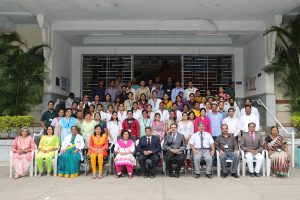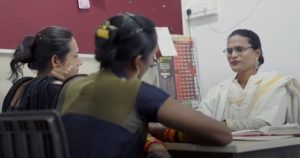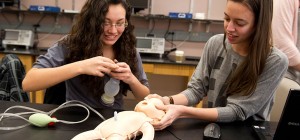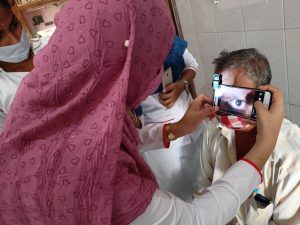Johns Hopkins & India Together: Our Impact
We work directly with partners in India on research, education, practice, and policy. Learn more about our impactful collaborations in the selected efforts below.
Research
GKII focuses on research with Indian partners that advances knowledge across disciplines and provides opportunities to learn from one another.

Addressing Critical Needs for HIV & Tuberculosis Prevention, Treatment, and Care
We work with partners in India to conduct research that eases the burden of HIV and tuberculosis. In the 1990s we worked together on technical guidance for enhancing India’s HIV research capacity, and our work continues with academic research institutions around the country. Established through a collaborative US National Institutes of Health grant in the early 2000s, the Clinical Research Site at BJGMC in Pune, Maharashtra, is world renowned for its research on HIV and tuberculosis and is one of very few research groups in the world to focus on these diseases across the life cycle from infancy to childhood, from adolescence to adulthood, and includes the unique and understudied stages of pregnancy. Findings from this collaboration have resulted in changes in patient care guidelines that have saved millions of lives around the world.
 The JHU ACCELERATE Project currently works with partners across India to implement, evaluate, and transition promising models of HIV prevention, testing, and care. Some key achievements include providing technical assistance to ART centers that serve more that 100,000 people living with HIV, providing support services to more that 7,500 children living with HIV, establishing India’s first community-led transgender clinic, and drafting India’s first PrEP guidelines in collaboration with NACO. The effort has diagnosed more than 3,000 new HIV cases and referred them into care, and established SafeZindagi, India’s first comprehensive online sexual health platform.
The JHU ACCELERATE Project currently works with partners across India to implement, evaluate, and transition promising models of HIV prevention, testing, and care. Some key achievements include providing technical assistance to ART centers that serve more that 100,000 people living with HIV, providing support services to more that 7,500 children living with HIV, establishing India’s first community-led transgender clinic, and drafting India’s first PrEP guidelines in collaboration with NACO. The effort has diagnosed more than 3,000 new HIV cases and referred them into care, and established SafeZindagi, India’s first comprehensive online sexual health platform.
Our work with 9 institutions throughout India as part of the RePORT (Regional Prospective Observational Research for Tuberculosis) India collaboration represents the most productive effort of a global tuberculosis research program that partners US institutions with institutions in countries with a high burden of tuberculosis. Other participating countries include Brazil, South Africa, Indonesia, China, and Philippines. Through our partnerships, we are leading the global effort to discover the best ways to prevent, diagnose, and treat tuberculosis and multidrug resistant tuberculosis.
COVID Surveillance & Contact Tracing
Working with colleagues within the Governments of Andhra Pradesh and Tamil Nadu and the Center for Disease Dynamics, Economics and Policy in New Delhi, we recently conducted a study using COVID-19 surveillance and contact tracing data to understand disease transmission and patient outcomes in South India. Disease modeling has been undertaken in the US and in European countries, and this study was conducted to provide insight about disease control in other settings. The team found that the highest transmission rate occurred among a much younger population than transmission in other countries, and there was a lower incidence of COVID-19 among older adults in Tamil Nadu and Andhra Pradesh relative to the US and other high income countries. The team identified many factors that could correlate with the difference, but the findings highlight that while a pandemic may be global, successful efforts to control it must comprise data-based measures that are tailored for local circumstances.
Epidemiology and transmission dynamics of COVID-19 in two Indian states. Science. 2020;370(6517).
Genomic Research for Bladder Cancer
With Tata Memorial Cancer Center, we are collaborating on quantitative genome-wide association studies that cut across multiple areas of modern population-based biomedical science including statistical genetics/genomics, precision medicine and big data to make bold new discoveries related to bladder cancer. The goals are to discover new biomarkers that signal cancer susceptibility, understand disease mechanisms, characterize disease risk, and develop risk-stratified approaches to disease prevention.
Education
We develop tailored education and training programs with Indian partners seeking to enhance professional capacity.
Masters Programs
The Johns Hopkins Whiting School of Engineering (WSE) and Amity University signed a memorandum of understanding with a goal of working together to create opportunities for Indian students to pursue masters degrees. Together, the institutions have launched a unique pathway for a Master’s program in Engineering that entitles a student to pursue a part of the program in India with Amity and complete the balance at the JHU campus in Baltimore, USA. This helps a student save more than half the cost of the actual program.
Course Development: The COVID-19 Response in India: Impact on Women & Children’s Health and Wellbeing
The Johns Hopkins Maternal and Child Health Center India, recently shared its third iteration of its most popular course offering: The COVID-19 Response in India: Impact on Women and Children’s Health and Well-being. The course focuses on solutions and lessons learned and includes a dozen guest experts, including health systems experts and policymakers from India. The program is regularly updated, and the most recent version leveraged a new partnership with the National Health Systems Resource Center (NHSRC), which incorporated the most recent guidelines from the Ministry of Health and Family Welfare (MOHFW).
 Training Next Gen Biomedical Engineers
Training Next Gen Biomedical Engineers
The Center for Bioengineering Innovation and Design (CBID), a joint effort of the Johns Hopkins Whiting School of Engineering and the School of Medicine, creates and develops solutions for major challenges to human health. A large focus of its work is in India. CBID measures its success by the impact students and their solutions have on the quality and accessibility of health care worldwide. The center’s bedside-to-bench-to-bedside model gives students the opportunity to identify needs, work in teams to develop solutions, and commercialize those solutions for broad availability.
Each year, teams of biomedical engineering students are presented with a pool of med-tech and global health projects that constitute a clinical problem in need of a solution, and they work together to develop integrated health technology to address them. Below is a sampling of student-led translational biodesign efforts.
Nursing Training & Education Partnership
Johns Hopkins School of Nursing and College of Nursing Christian Medical College (CMC), Vellore, India, recently signed a memorandum of understanding (MOU) with a goal of working together to create opportunities for research and collaboration. Together they will identify research projects which can be carried out jointly, look for opportunities for joint scientific and cultural events, exchange information and academic publications, promote education and training, and offer exchange opportunities to faculty members and graduate students. Under the MOU, GKII helped fund a mental health project to address COVID-19 nursing care-related trauma and support to CMC’s 3,200 nurses and 850 nursing students.
Practice
Our collaborations advance clinical and public health practices that improve health outcomes and help people live healthier and longer lives.
Strengthening Primary Health Care
The India Primary Health Care Support Initiative works with central and state governments in India, national and international civil society organizations, and academic institutions to create a supportive ecosystem for improving the primary health care system by promoting sound policies, improved government management and technical capacity, and better coordination among various stakeholders. Together, we are:
- Conceptualizing and piloting new primary health care service delivery models, and integrating primary health care with hospital care in the context of the national PM-JAY insurance program
- Developing trainings to inform global development on primary health care systems and implementation research
- Organizing learning exchanges with exemplar primary health care models within India and abroad
- Creating a national comprehensive primary health care learning network
- Developing evidence based primary health care policy
Prioritizing Healthy Environments: Primary Air Care
Unhealthy environments and ecosystems are drivers of disease emergence, poor water quality, dead zones in coastal waters, collapse of fisheries, and shifts in regional climates, including the creation of dry land ecosystems, which are characterized by lack of water. Working with local partners and municipal government, the Alliance for a Healthier World (AHW) is developing a data-driven plan to achieve a sustainable mobility transition in Delhi comprising a package of interventions to reduce harmful emissions. The package will provide decision makers and implementers in Delhi with data and tools to combat ambient air pollution. Rather than focus on a wide variety of strategies that may or may not work, PAC provides teams in Delhi with the information needed to make thoughtful decisions and begin their implementation. The Initiative for Sustainable Energy Policy (ISEP) at the Johns Hopkins School of Advanced International Studies will play a coordinating role between Johns Hopkins researchers and local partners leveraging existing relationships in the region.
 Eliminating Avoidable Blindness
Eliminating Avoidable Blindness
A social venture studio conceived of in the Wilmer Eye Institute and Center for Bioengineering Innovation & Design at Johns Hopkins University, the Global Institute for Vision Equity (GIVE) is powered by a team of technologists, ophthalmologists, and social entrepreneurs. Its mission is to eliminate avoidable blindness globally through development, translation, and distribution of solutions addressing the most critical eye care needs in low-to-middle-income countries, and designed for the patients, care providers, and context of care in under-resourced settings. Working with Aravind Eye Care System and a network of Indian partners, GIVE is discovering and evaluating biological and social factors that lead to inequities in eye care, designing and developing affordable solutions to address unmet eye care needs, partnering with local and international stakeholders to test and implement innovations, and education and train multidisciplinary leaders who can solve major global health challenges.
 Addressing COVID Vaccine Hesitancy
Addressing COVID Vaccine Hesitancy
In India (like in many parts of the world) the spread of misinformation and disinformation about COVID caused people to be hesitant about getting vaccinated. To strengthen the country’s confidence in vaccines, we worked with partners to develop the Teeka Lagwaya Na? campaign to dispel misinformation about COVID vaccines and encourage vaccination. The campaign focused on ordinary people—a fisherwoman, a sarpanch, and a respected uncle—and was centered around one simple question: “You got vaccinated, right?”
Policy
Findings from our impactful partnerships have influenced health policy changes in India and globally.
HIV Care Policy: Preventing the Transmission of HIV from Mothers to Infants during Breastfeeding
BJGMC in Pune and Johns Hopkins University collaborated on a multinational trial and together discovered a therapy that decreases transmission of HIV through breast milk by 40%. The findings were adopted by the World Health Organization into its clinical care guidelines, changing health care policy globally and saving countless lives.
Tuberculosis Care Policy: Keeping Patients Engaged in Care
Side effects from tuberculosis medications, and lengthy courses of treatment, cause people to stop taking them. Research from several of our collaborations has found that medication can be taken over a shorter period of time than World Health Organization care guidance calls for. Shortening the treatment period increases the likelihood that patients stay engaged in care. The studies conducted through our partnerships have had global impact by changing guidelines for patient care for both adults and children.
Trade Policy: Internal Barriers to Trade in India
Internal barriers to trade within countries have become a focal point of development policy in recent years. These barriers consist of infrastructure barriers but also of other factors including tax differentials across states within a country, internal tariffs, frictions associated with tax collection at state borders, and associated corruption and rent-seeking behavior. These distortions can significantly alter incentives for production, consumption, and trade in the economy. In ongoing research, the Johns Hopkins School of Advanced International Studies looked at a unique policy shift toward eliminating internal policy distortions to trade in India – the introduction of the Goods and Services Tax in 2017. Historically, the internal movement of goods in India was subject to multiple barriers, including inter-state taxes, and differences in state tax structures and cumbersome inspections, especially at state borders, led to long delays in the movement of goods. When the Goods and Services Tax (GST) was implemented in India, it simplified India’s multilayered federal, state, and local indirect tax structure and unified the nation into a common economic market. The policy research found that harmonizing internal taxes and eliminating taxes on cross-state movement of goods would result in a substantial increase in internal trade. Further, lowering internal barriers to trade is predicted to increase external trade substantially.